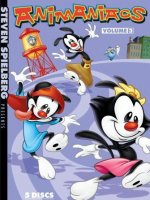
BUY IT AT AMAZON: CLICK HERE!
STUDIO: Warner Bros.
MSRP: $44.98
RATED: NR
RUNNING TIME: 750 Minutes
SPECIAL FEATURES:
• Character design featurette
• Music featurette
The Pitch
"What if cartoons became self-aware?"
The Humans
The fine vocal stylings of Tress MacNeille, Rob Paulsen, Jess Harnell, Maurice LeMarche, and many more than you could shake a stick at. Go on. I dare you.
The Nutshell
The Warner Brothers, Yakko and Wakko, and their sister, Dot, continue to run amok in California, in the Elysian Fields, in the past, the future, and in Japanese. They are ably assisted by a gaggle of compadres, though dear Pinky and the Brain leave the show to start their own partway through the season.
The Lowdown
I’ve crowed about the glories of the Animaniacs in two previous reviews, for the first and second volumes, here and here. Not only was this show a staple of my childhood, but I’ve found that returning to it as an adult is even more rewarding than my nostalgia could ever be. And here’s the kicker: the show got better with age.
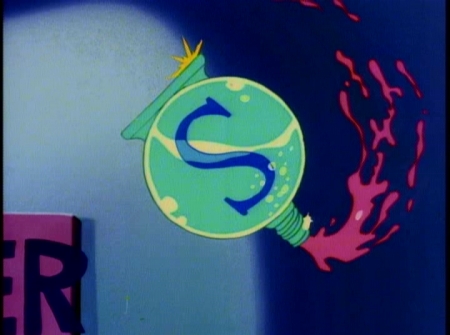
It is 1955. I am in the water tower. It is 1997. I am on Mars and I can feel Dot shaking in my arms.
It is raining. In twenty-five minutes it will begin raining.
In some senses, anyway. As the years ground by on Spielburg’s ‘toon, the headlining Yakko, Wakko, and Dot went from amusing to venerable, with occasional visits to hilarious. The earlier parodies of classical literature, send-ups of famous people, and self-referential humor was generally on-the-money; but here int he third volume you can watch them progress to heights of significant satire. Some of these shorts extend beyond being mere lampoons of their subject material, and, though making you groan with the puns, you’ll probably feel a sly smile spread across your face more than once. Especially if you’re a pretentious nutbag, such as I am.
The shorts devoted to Slappy the Squirrel continued to improve over this volume’s span, as well. She started out the show as a side-‘toon whose "hook" was that she was a cranky old cartoon star, but without much to distinguish her shorts from, say, the Goodfeathers’ in terms of structure. In the shorts on this volume, the writers have devoted quite a bit of time to reinventing the Looney Tunes of bygone days, with games of cat-and-mouse, incompetent villains, and plenty of violence. The difference is that they’re writing them around a character who has already been through all this stuff; she’s a legend of the cartoon world, and she knows every trick in the book. She’s not a trickster god, like Bugs Bunny; she’s tired and omniscient, like the Christian god. It’s a great move on the part of the writing team because the shorts contain exactly the same elements that attracted kids to the source material, but with that added layer of irony that perks up the ears of this adult.
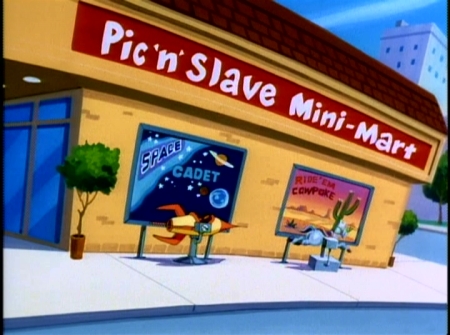
I am petrified at the thought of making a joke about this.
Unfortunately, not all the supporting cast received such careful improvement. It was over the course of this season that the inestimable Pinky and the Brain split off into their own show, so they only appear on the first couple of discs. After that, the opening theme song changes to accomodate their absence, and the episodes begin to fill with… Buttons and Mindy, Rita and Runt, and the Goodfeathers. Those were always the three weakest of the show’s teams, in my opinion. With Pinky and the Brain gone, and no new characters stepping in to fill the void, we get a lot of what feels like filler material; or, if not filler, than the products of writing teams having to return to certain characters more frequently than they have solid ideas for. None of the shorts are particularly bad, but they do lack the sardonic finesse of Pinky and the Brain, the Warners, and Slappy.
They even get dull, once in a while.
Fortunately, the episodes that begin and end strongly far outweigh in number the ones that sag. Rather than mutter on in the abstract any more, I’d like to pick on a few of my favorite shorts from this set; the ones that exemplify what keeps me happily returning to this show in my arguable adulthood.
Variety Speak: This song-and-dance number is built off of Wakko inability to understand a headline from the Variety trade magazine. His siblings proceed to educate him by means of a catchy tune, informing their brother than you’ll never make it in Hollywood unless you can decipher the phrase: "Paramount Hurts and They’re Losing Their Shirts." (Yakko gives the translation: "It means Schwarzenegger’s doing King Lear.") Plenty of ludicrous examples of Variety-speak are included. I love this one because how often do you get to see The Player-esque Hollywood satire in a cartoon?
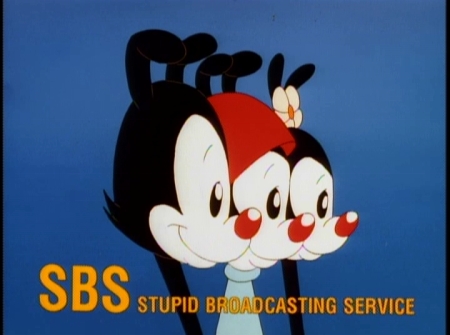
It’s no "I have Fox standards and practices to uphold!" but it’ll do.
Please Get A Life Foundation: This short, cast as an infomercial, pokes a healthy amount of fun at fanboys in general, using inane trivia from Animaniacs as a stand-in for every other lame geek obsession to occupy the mindspace of people who might be intelligent and contribute something to society if they stopped caring about unimportant minutiae. This short is a great example of how the writers can communication some serious, unmitigated frustration with tongue in cheek.
Brain Meets Brawn: One of the few Pinky and the Brain shorts in the box, and one of my very favorites. "Brain Meets Brawn" has Brain launching a scheme to steal Dr. Jekyll’s formula, make himself monstrously strong, and then stop Big Ben at precisely four o’clock so the English will always think it is tea time. The schemes are usually the funniest bit of each Pinky and the Brain short for me, but this one got me with the execution, as well. Who ever thought that making Brain angry would be difficult for Pinky to do?
Macbeth: A quick Cliff’s Notes version of the opening scene of Shakespeare’s tragedy, "Macbeth" has Yakko appearing in the corner of the screen to provide gloss for all the antiquated language. Like so:
Witches: "Double, double, toil and trouble / Fire burn and cauldron bubble."
Yakko: "Loosely translated, that means ‘abracadabra.’"
Funny and literary!
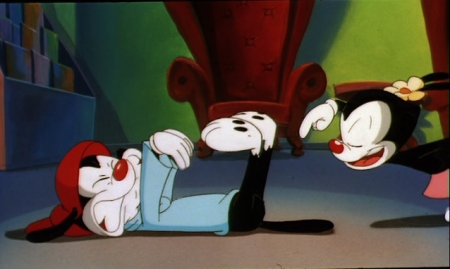
Lo, it extrudes!
Deduces Wild: Speaking of literary, I’ll finish off here with this short, which has the Warners trying to convince Sherlock Holmes to help them with their scavenger hunt. The problem is, Holmes’ arch-nemesis, Mariachi (in a sombrero, which is just irreverent enough to get me started) is also on the same scavenger hunt. I’m fond of this short because it puts the Warners’ gleeful cartoon physics and logic up against the world’s greatest detective, and the cognitive dissonance hums ilke a harp.
I love this show more and more, every time I sit down to one of these sets. My young self didn’t get to watch it in sequence — just in reruns after school — so I’ve got no hint as to whether the quality eventually declines. Until then, enjoy the hell out of the perfect blend of cogent satire, dreadful puns, and slapstick animation.
The Package
These sets have never included much in the way of bonus materials. There’s a featurette on character design given the long-winded title: "They Can’t Help It If They’re Cute, They’re Just Drawn That Way," and a featurette on the music, which is always used to great effect, like the classic Merrie Melodies. That one’s called "They’re Totally Insane-y In Cadence With Richard Stone," and centers around a tribute for Mr. Stone, who has passed away. Without ever seeing himself immortalized on DVD.
I don’t want to end like that.